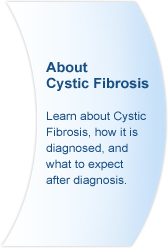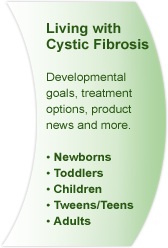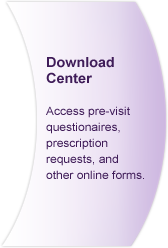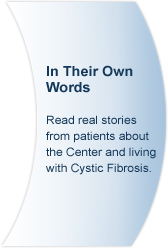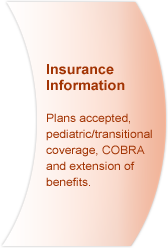|
|||||||
 |
 What is Cystic Fibrosis? Cystic Fibrosis is a chronic disease affecting the lungs and digestive system of about 30,000 children and adults in the US. A defective gene and its protein cause the body to produce thick sticky mucus that clogs the lungs and obstructs the pancreas and stops natural enzymes from helping the body break down food and absorb nutrients.
Cystic Fibrosis is a chronic disease affecting the lungs and digestive system of about 30,000 children and adults in the US. A defective gene and its protein cause the body to produce thick sticky mucus that clogs the lungs and obstructs the pancreas and stops natural enzymes from helping the body break down food and absorb nutrients.Approximately 1,000 new cases of CF are diagnosed each year. Most patients (about 70%) are diagnosed by age two, and more than 45% of the CF population is 18 or older. 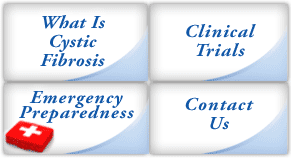
CF is NOT contagious. People with CF may cough a lot because of the mucus in their lungs, but CF must be inherited - you cannot "catch" CF, nor can you "give" it to someone else. CF is also NOT caused by anything the parents did before or during the pregnancy, but by a pair of recessive defective genes. Symptoms of CF:
How is CF diagnosed?Sweat TestIf a person has symptoms of CF, the doctors will usually perform a sweat test to determine if CF is the cause. Sweat testing is a simple, painless test which measures the salt concentration in a person's sweat. Sweat is collected from the person's skin and sent to a lab for diagnosis. A high level of salt indicates CF. If the test results are positive, a second test will most likely be performed to confirm the diagnosis.Newborn ScreeningMany states automatically test newborns for CF as part of the standard newborn screening procedures. Early diagnosis means that high calorie-high fat diets and airway clearance and enzyme therapies can be implemented before the child is symptomatic - which can delay the onset of CF complications and offer a better chance for a healthy future.Genetic TestingIf a family member has CF, family members may be identified as carriers. Labs test the blood or cells from the inside of the cheek of the person with CF to identify that family's specific mutation of the CF gene. Other family members can then be tested for that mutation to find out if they are carriers. There are more than 800 different CF mutations identified, and while it is possible to test for these, testing will not recognize an as-yet undiscovered mutation.What to expect after diagnosisThere are many treatments which are enabling patients to live longer, healthier lives - go to school, get married, exercise, and have children. The most important factors to remember when living with CF is to work with your CF treatment team regularly, take all medications and supplements as prescribed, and to exercise regularly. Healthy CF genes make a protein - CFTR (Cystic Fibrosis conductance Transmembrane Regulator) - found in cells that line organs like the lungs and pancreas. CFTR controls the movement of chloride, sodium and other electrically charged particles through the cells. When the protein is defective, the salt balance in the body is disturbed - which causes the thin layer of mucus that normally coats and protects the lungs to become thick, which clogs the airways and leads to infections . The thick secretions also block the flow of digestive enzymes from the pancreas to the intestines, which causes digestive problems in most CF patients. The Cycle of CF Progression:
There are many tests your doctors may order to see how your body is working with CF.
Living with CF - an overviewWhen you take control of your Cystic Fibrosis, you take control of your life. There are many things that can be done to slow the damage to your lungs, and keep you healthier all around. It is very important that you see your CF treatment team regularly, and follow the treatments prescribed by your doctor. You can learn a lot more about Living with CF on this site. Most people with CF will, on a daily basis:
Do not take any medications unless prescribed by your doctor!
ExerciseMost children and adults with CF can participate in almost any physical exercise - like anyone else, start off slowly and review any new exercise programs with your doctor.. Because of the CF and the higher concentrations of salt that will be lost through sweat, it is very important to make sure extra fluids and salts are taken when exercising strenuously or in hot weather. Exercise helps loosen mucus, making it easier to cough up; stimulates coughing; builds strength and endurance of the breathing muscles; and increases the overall fitness of the cardiovascular system.Airway ClearanceWith CF, the cilia, which move the mucus in healthy lungs, are thickened and less effective. Clearance techniques loosen the mucus in the lungs and airways so it can be coughed up — this keeps mucus out of lungs to improve breathing and reduce/avoid infections. Learn more about proper Clearance Techniques.Types of Clearance: Postural Drainage with Clapping Autogenic Drainage Positive Expiratory Pressure Active Cycle of Breathing Flutter Airway Clearance Lung TransplantationThe repeated lung infections and inflammations lead to chronic lung disease in almost all CF patients. Lung transplants do not "cure" CF, because other organs are affected by CF as well, but do provide the patient with a new set of lungs. Transplants risk organ rejection, and will require additional medications to prevent rejections.Gene TherapiesAt present, research is ongoing into potential gene therapies which might cure CF, but are not currently available.How do I pay for all this treatment?Talk to us! We take most forms of insurance, and if we're not on the panel for your policy, will contact them to get approved. Our social workers can put you in touch with specific programs - through the Cystic Fibrosis Foundation, drug companies, the hospital, the state and the federal government - created to help you deal with the financial and social issues that arise from living with CF. Cystic Fibrosis Services is a specialty pharmacy and a subsidiary of the Cystic Fibrosis Foundation, and is affiliated with more than 5,000 insurance plans and 40 state and federally funded programs. The Cystic Fibrosis Patient Assistance Program (CFPAP) is a non-profit subsidiary of CFF that helps qualified people with CF pay for high-cost nebulized treatment. |
||||||
